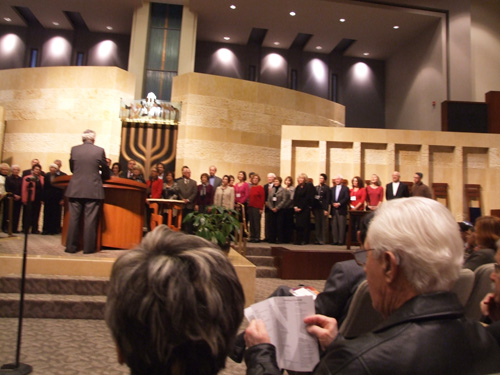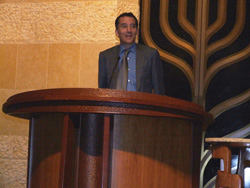
By Donald H. Harrison

SAN DIEGO–Congregation Beth Israel, celebrating its sesquicentennial year, on Thursday evening, Jan. 19, honored some five dozen past and present leaders from its congregation who have built and led the organizations that serve the Jewish community of San Diego. It treated these leaders and other members of the Reform congregation to a speech by Conservative Rabbi David Wolpe of Sinai Temple in Los Angeles about the man whom Jewish tradition considers the greatest leader Jews ever had: Moses.
There was a touch of irony in this subject matter, in that Wolpe has been a controversial figure in some Jewish quarters ever since he gave a sermon challenging whether the Exodus, as described in the Torah, actually ever happened. Asked about this in a question-and-answer session following his speech, he responded that whether or not the Exodus story is factual, it is true metaphorically. In every generation, he said, Jews have departed lands where they were oppressed.
Wolpe said that the Bible does not specifically say why God chose Moses to lead the Israelites, nor does it explain, for that matter, what God’s reasoning was in choosing any of the other great biblical leaders such as Noah, or Abraham, or Jacob. The reasons have to be puzzled out.
Torah describes Moses in three similar situations, Wolpe taught. He intervened when an Egyptian was beating an Israelite, killing the Egyptian. He separated two Israelites who were fighting. And he came between two quarreling Midianites. Moses made it his problem whenever bitter controversy arose, both when his people, the Israelites, were involved and even when they weren’t. Justice, justice, justice, Moses pursued. On another occasion, Moses tracked down a wandering sheep, and let the animal drink before carrying it on his shoulders back to the flock.
Wolpe suggested that God recognized that Moses, who demanded justice and also demonstrated great compassion, was a man of high potential, even though he had flaws. Among his greatest flaws was his tendency to lash out, to hit rather than to talk. He angrily hit the Egyptian whom he killed; he impatiently struck a rock to obtain water, rather than using his words in those situations. Part of leadership, said Wolpe, is to be slow to anger, to be able to talk matters through, to be a calming presence amidst communal anxiety.
Whereas people may judge other people by what they see on the outside, God looks into their hearts and measures their potential, Wolpe taught. All of us should try to see the potential in other people, by looking deeper than their surface appearances. This too is leadership.
Shepherds in the Bible, he added, often demonstrate leadership qualities, by caring for creatures who are weaker, less important, and clearly not in a position to help them. Wolpe said anyone can demonstrate kindness to people who are rich and powerful, but caring for people who are not in a position to repay the favor is another mark of leadership.
The rabbi retold a Shlomo Carlebach anecdote of an Eastern European town where the Jews were panicked by rumors that there would be a pogrom. They sent their children to stay with the rabbi, including one boy who stayed in a corner, unable to sleep because of the cold. Seeing this. the rabbi quietly wrapped his coat around the child, providing him the equivalent of a blanket. The boy never forgot the rabbi’s kindness and although others in his community were suspicious of Carlebach because his ways were strange, the boy, now grown to an old man, welcomed him. In a sense, he wrapped Carlebach in another blanket of kindness. This too is a form of leadership.
Host Rabbi Michael Berk praised the contributions of the many people in Beth Israel’s sanctuary who served as presidents and executive directors of such organizations as the Jewish Federation, San Diego Jewish Academy, B’nai B’rith, Jewish Community Foundation, Israel Bonds, Jewish Family Service, Waters of Eden, Hillel of San Diego, Jewish Women’s Foundation, AIPAC, Lawrence Family JCC, Anti-Defamation League, Seacrest Village Retirement Communities, San Diego Center for Jewish Culture, American Jewish Committee, Agency for Jewish Education, Hadassah Southern California, and Jewish Federation Women’s Philanthropy.
Through their efforts, Berk said, such leaders made sure that San Diego had a vibrant and strong Jewish community.
Following his formal address, Wolpe was asked what can be done to encourage children to remain Jewish. Leading organizations is important, of course, but what occurs outside of the home will not inspire the children or grandchildren as dramatically as what happens in their presence, he responded. That which will inspire — that which will lead children into committed Judaism–is that which parents and grandparents do at home in their children’s view. Do they read Jewish books, discuss Jewish issues, light Shabbat candles, keep kosher? If they don’t, then why should the children?
*
Harrison is editor of San Diego Jewish World. He may be contacted at donald.harrison@sdjewishworld.com